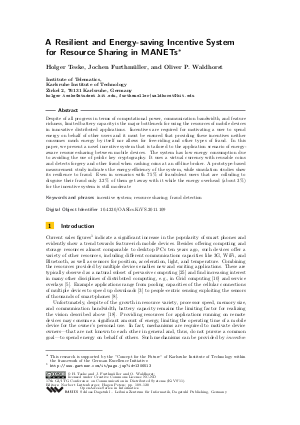A Resilient and Energy-saving Incentive System for Resource Sharing in MANETs
Authors Holger Teske, Jochen Furthmüller, Oliver P. Waldhorst
-
Part of:
Volume:
17th GI/ITG Conference on Communication in Distributed Systems (KiVS 2011)
Part of: Series: Open Access Series in Informatics (OASIcs) - License:
 Creative Commons Attribution-NonCommercial-NoDerivs 3.0 Unported license
Creative Commons Attribution-NonCommercial-NoDerivs 3.0 Unported license
- Publication Date: 2011-02-25
File

PDF
OASIcs.KiVS.2011.109.pdf
- Filesize: 1.35 MB
- 12 pages
Document Identifiers
Subject Classification
Keywords
- incentive system
- resource sharing
- fraud detection
Metrics
- Access Statistics
-
Total Accesses (updated on a weekly basis)
0Document
0Metadata
Abstract
Despite of all progress in terms of computational power, communication bandwidth, and feature richness, limited battery capacity is the major bottleneck for using the resources of mobile devices in innovative distributed applications. Incentives are required for motivating a user to spend energy on behalf of other users and it must be ensured that providing these incentives neither consumes much energy by itself nor allows for free-riding and other types of fraud. In this paper, we present a novel incentive system that is tailored to the application scenario of energyaware resource-sharing between mobile devices. The system has low energy consumption due to avoiding the use of public key cryptography. It uses a virtual currency with reusable coins and detects forgery and other fraud when cashing coins at an off-line broker. A prototype-based measurement study indicates the energy-efficiency of the system, while simulation studies show its resilience to fraud. Even in scenarios with 75% of fraudulent users that are colluding to disguise their fraud only 3.2% of them get away with it while the energy overhead (about 3%) for the incentive system is still moderate
Cite As Get BibTex
Holger Teske, Jochen Furthmüller, and Oliver P. Waldhorst. A Resilient and Energy-saving Incentive System for Resource Sharing in MANETs. In 17th GI/ITG Conference on Communication in Distributed Systems (KiVS 2011). Open Access Series in Informatics (OASIcs), Volume 17, pp. 109-120, Schloss Dagstuhl – Leibniz-Zentrum für Informatik (2011)
https://doi.org/10.4230/OASIcs.KiVS.2011.109
BibTex
@InProceedings{teske_et_al:OASIcs.KiVS.2011.109,
author = {Teske, Holger and Furthm\"{u}ller, Jochen and Waldhorst, Oliver P.},
title = {{A Resilient and Energy-saving Incentive System for Resource Sharing in MANETs}},
booktitle = {17th GI/ITG Conference on Communication in Distributed Systems (KiVS 2011)},
pages = {109--120},
series = {Open Access Series in Informatics (OASIcs)},
ISBN = {978-3-939897-27-9},
ISSN = {2190-6807},
year = {2011},
volume = {17},
editor = {Luttenberger, Norbert and Peters, Hagen},
publisher = {Schloss Dagstuhl -- Leibniz-Zentrum f{\"u}r Informatik},
address = {Dagstuhl, Germany},
URL = {https://drops.dagstuhl.de/entities/document/10.4230/OASIcs.KiVS.2011.109},
URN = {urn:nbn:de:0030-drops-29621},
doi = {10.4230/OASIcs.KiVS.2011.109},
annote = {Keywords: incentive system, resource sharing, fraud detection}
}
